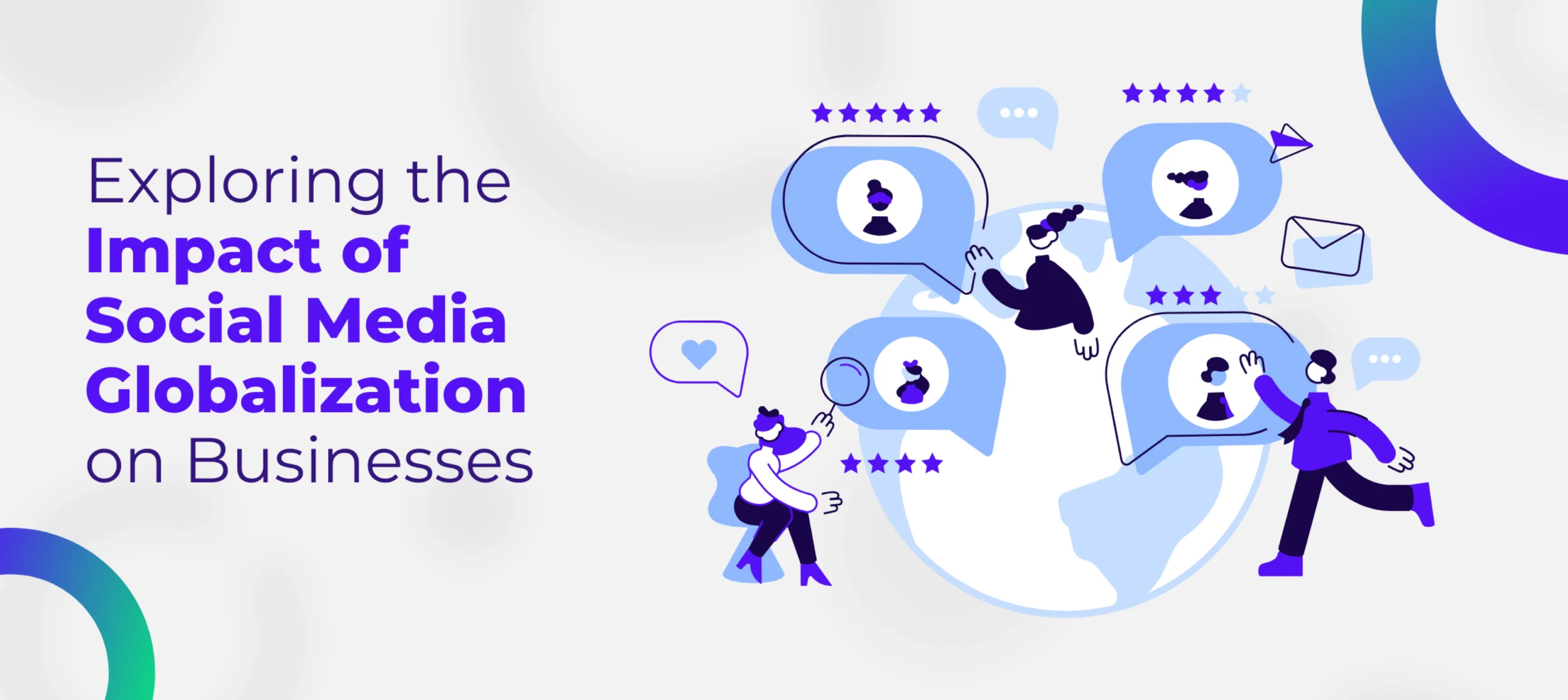Social media globalization has transformed how people and businesses around the world interact. Online connectivity has skyrocketed with the help of global platforms such as Facebook, Instagram, and X, bringing obvious opportunities yet its own set of challenges. In this article, we will explore the impact of social media globalization and how businesses have been affected by the widespread use of social media platforms across the globe.
The Role of Social Media in Globalization
Social media platforms have become a powerful tool to connect individuals, businesses, and communities, as well as facilitate the exchange of information, ideas, and cultures. With the rise of social media globalization, it has become easier for organizations to create and maintain international relationships with their customers, collaborators, and partners, by breaking down distance and language barriers.
Social media globalization also comes with concerns about its potential negative impacts on individuals and businesses, as its potential to spread misinformation and exacerbate existing inequalities is at the forefront of the challenges businesses must consider.
Social Media Platforms Expanding Globally
The global expansion of social media platforms makes them a powerful force in shaping global communication and culture. Platforms like Facebook, X, and Instagram are commonly used in many parts of the world, allowing individuals from diverse backgrounds and cultures to connect in real time.
The global expansion of social media connectivity led to the creation of global communities where users can share ideas, experiences, and perspectives regardless of their physical location. For businesses, the rise of social media is changing the way they use platforms to connect with customers across the globe, and how they can expand their reach into new markets.
Challenges and Concerns in Social Media Globalization
As social media platforms continue to expand globally, several challenges arise for organizations, from language barriers to global social media crises.
Cultural and language barriers in global communication
Social media platforms have the potential to connect people from all over the world, but culture and language can create challenges that make effective communication difficult. This can lead to misunderstandings, misinterpretation, and even inadvertently offensive language when it comes to topics that are sensitive or culturally specific.
Differing data laws
As more data continues to be created and data sharing has become more globalized, there is an increasing need for robust data privacy laws. Differences between laws in different countries (take the EU’s hardy GDPR laws compared with piecemeal regulations in the US for example) and jurisdictions leave gaps and vulnerabilities for companies that can lead to consequences like identity theft, unauthorized data sharing, and reputational damage, to name a few.
Another hotbed of data and privacy issues centers around countries trying to ban TikTok and its parent company ByteDance. Lawmakers in the United States, Europe, and Canada worked to restrict the platform in 2023 due to the risk of sensitive user data, and the discussion is an ongoing debate. Some countries, like India, have banned the platform altogether, while others have restricted it from government or official devices.
Adapting content and strategies to diverse markets
Some strategies and content can work in one market or culture, while not working at all in another. Businesses must be mindful of these differences when creating content for global audiences. This challenge requires a deep understanding of local cultures, customs, and values, as well as sensitivity to issues of representation and appropriation.
Managing reputation and handling social media crises globally
Due to its nature, social media has the power to amplify negative feedback or criticism to a potential crisis. When managing social media globally, crises can spread quickly from one part of the world to another. Effective reputation management requires a proactive approach to monitoring and responding to feedback. This approach ensures organizations stay on top of every social media mention and take action quickly to avoid or at least reduce the impact of a global crisis.
The Impact of Social Media on Global Business and Commerce
Social media has transformed the global market by providing new opportunities for organizations to connect with customers and expand their reach into new markets. Social media globalization impacted the way businesses interact in the global marketplace, the role of influencers in online advertising, and how crowdfunding and social commerce facilitate business.
Social media and the global marketplace
Social media channels enable brands to reach customers around the global marketplace, while customers get to shop for products and services from anywhere at any time. Social media globalization led to an era of global competition, where businesses must adapt to ever-changing markets and compete with a larger pool of businesses from across the world.
Influencers and online advertising
Social media advertising has become a major revenue source for many businesses, as it efficiently targets specific demographics and reaches customers in new and innovative ways. Influencers have become an integral part of the social media marketing strategy for many brands to promote products and services to global audiences, reach new audiences, and expand their social presence.
With influencer campaigns, brands can benefit from tapping into an influencer’s list of global followers that align with the brand’s target demographics to promote their products. Collaborations can boost product visibility globally and also enhance the brand’s credibility with this wider audience.
Crowdfunding and social commerce
Social media played an important role in the rise of crowdfunding and social commerce, creating new opportunities for both businesses and consumers. Social commerce platforms, such as Facebook and Instagram, facilitate the buying and selling of products directly on social media.
Alternative to traditional business loans, crowdfunding platforms such as Kickstarter enable small businesses to raise money through donations and investment by leveraging social media connections to gain support and investments globally. Both strategies are based on harvesting the power of social media to achieve a common goal by connecting with potential investors and customers worldwide, accelerating collective actions toward shared objectives.
Future Trends of Global Social Media
Global social media keeps evolving and expanding, and with that comes several new social media trends that are most likely to shape organizations working in the global landscape.
The rise of decentralized social networks
Decentralized social media networks have gained momentum in recent years. Compared to traditional social media platforms, these networks are designed to be more secure, private, and user-controlled. A well-known example of a decentralized network is the blockchain technology underlying cryptocurrencies (Bitcoin and Ethereum).
This technology enables users to connect without a centralized server, meaning that users have more privacy and security (and control) over their data and what information they want to share with others. Decentralized networks allow greater freedom of expression, as they are not subject to the same censorship and content moderation policies as traditional social media platforms.
Addressing cultural sensitivities and censorship
Cultural sensitives and censorship are complex issues that require careful consideration and respect for diverse perspectives. As social media platforms expand globally, businesses must learn how to navigate this landscape to create a more inclusive and equitable social media environment that respects cultural norms, values, and expectations.
This also includes the need to address censorship and free speech issues, which can vary widely from one country to another. In recent times, there has been a surge in the enactment of layered laws around the globe, further emphasizing the need for businesses to balance the needs of different communities, while ensuring they can remain true to their country’s laws, and their brand’s principles.
Censorship issues, ranging from content restrictions to platform bans, like TikTok, add another layer of complexity, with businesses needing to navigate these challenges while maintaining their online presence and engagement with their audience.
Advancements in technology and integration with virtual reality
Advancements in technology have changed the way we perceive and interact with the world around us. Virtual reality, for example, has the potential to create new immersive experiences that enable users to connect with individuals and brands in new and innovative ways. Some of the applications of this technology include the simulation of real-life situations, such as virtual shopping experiences, virtual concerts, and virtual events. As VR technology evolves, brands and customers can expect to see more of its innovative use in the competitive global marketplace.
Conclusion
With social media globalization, organizations must continue to adapt and leverage these platforms to remain competitive in the global marketplace. Learn more about how your business can adapt to the opportunities and challenges of social media globalization by scheduling a call with us today.

